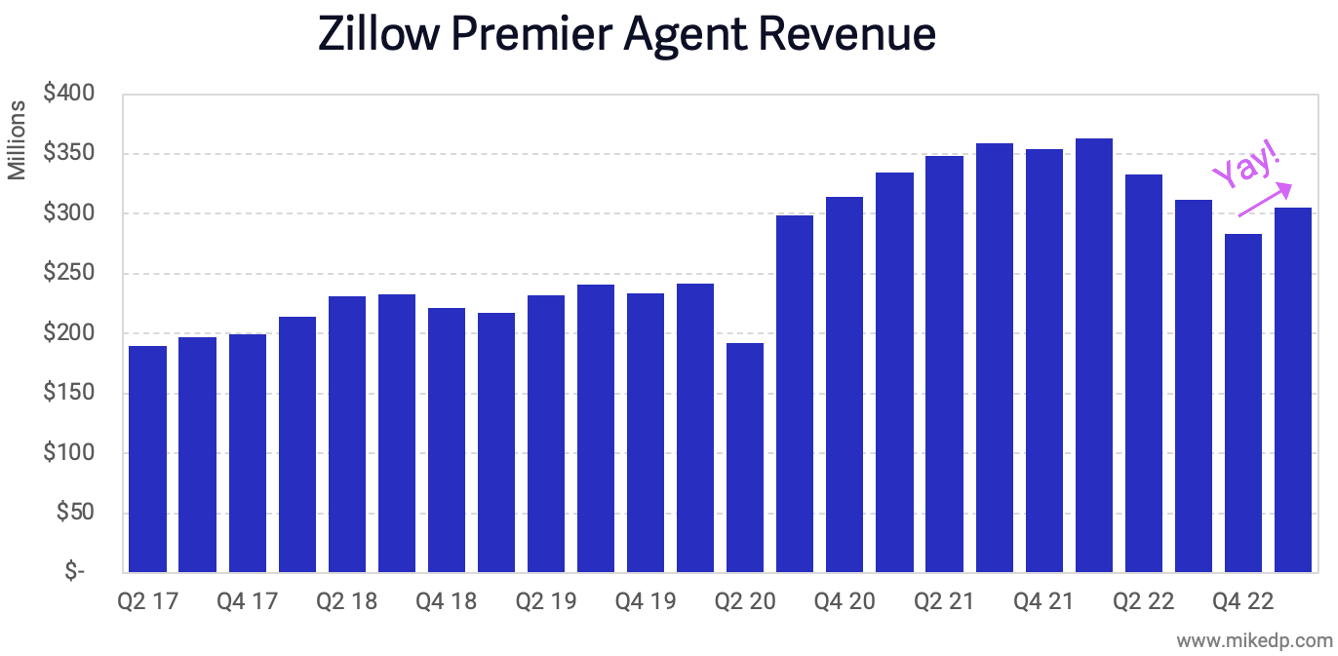Zillow 3.0: Is It Working?
/Zillow’s latest earnings reveal growth in its core Premier Agent business after nine months of decline – the longest in the company’s history – a promising result of Zillow’s new strategy.
Why it matters: The next iteration of Zillow revolves around a back to basics strategy of generating more leads and monetizing those leads through an integrated consumer experience (a super app).
But a change in financial reporting will make it more difficult to track the various components of the business on its journey to building that super app.
Zillow’s Premier Agent revenue increased during the first quarter of the year, breaking a nine-month losing streak – the longest consistent revenue decline in the company’s recent history.
Premier Agent revenue was up 8 percent from Q4 2022 (but still down 16 percent from the heady days of early 2022, when the market was at its peak).
Comparatively, Zillow had a strong quarter – its Premier Agent business outperformed the market year-over-year and quarter-over-quarter.
Compared to the same period last year, overall transactions in the market were down 26 percent, compared to a 16 percent decline in Premier Agent revenue.
And compared to last quarter, market transactions were down 14 percent while Zillow managed to grow its Premier Agent revenue 8 percent – a noteworthy achievement!
Zillow’s ability to outperform the market comes down to two activities: capturing a higher percentage of leads in the market, and generating more revenue per lead.
Zillow’s stated goal is to double its share of customer transactions from 3 to 6 percent by the end of 2025.
ShowingTime and Flex are both designed to engage more consumers and increase conversion rates, resulting in more leads and more revenue per lead.
Zillow Home Loans is another source of revenue growth, and the company continues to invest in it.
The segment saw an increase in revenue during the latest quarter, but the change in financial reporting means we’ll no longer be able to see profitability for the segment – after six years of losses and two years of me writing about those losses.
Losses aside, Zillow continues to invest in its mortgage business and is hiring more mortgage loan officers (MLOs) to handle an increase in volume.
This is a good reminder that mortgage is very much a people business and not a scalable technology business.
The bottom line: Zillow’s path forward is dependent on its ability to capture more leads, further monetize those leads, and attach ancillary services like mortgage – a super app leading to super revenue.
But Zillow’s change in financial reporting will make it more difficult to track, with any degree of granularity, which pieces of the puzzle are working well and which are struggling.
Still, the numbers (while they last) don’t lie – the company’s recent performance relative to the market underscores the powerful position Zillow occupies at the top of the consumer funnel and its ability to affect change for consumers, agents, and the entire industry.
















